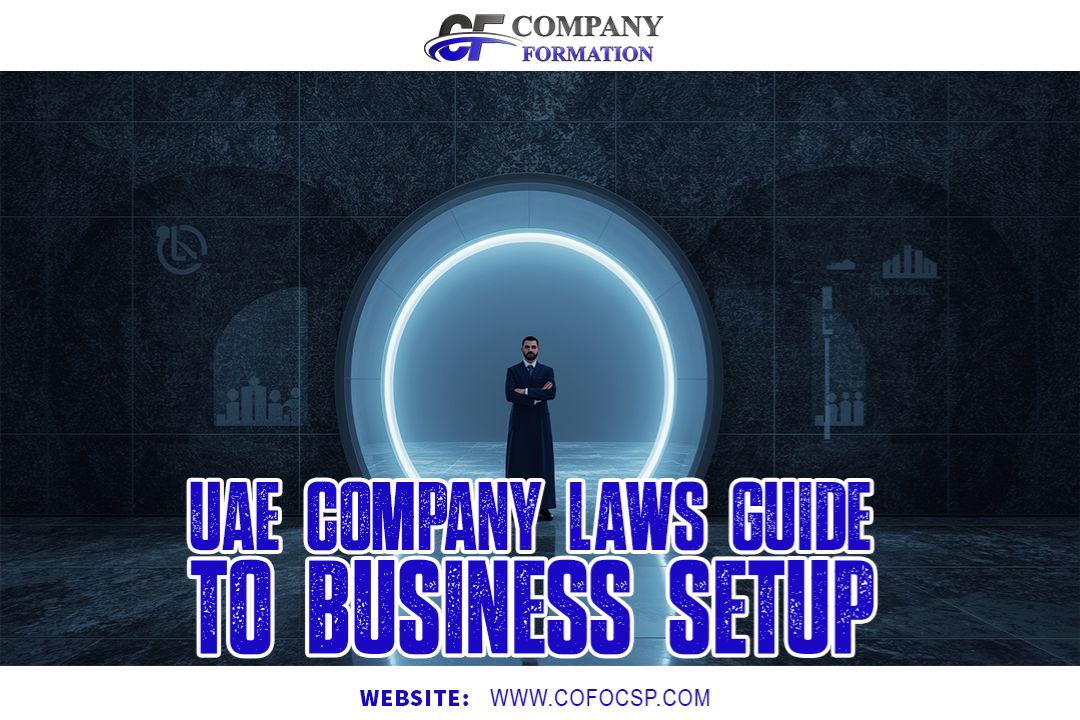UAE Company Laws? Guide to Business Setup in the UAE
Are you wondering what are the UAE Company Laws and how they impact setting up a company in Dubai or other Emirates? The UAE Commercial Companies Law, primarily Federal Decree Law No. 32 of 2021, alongside earlier frameworks like Federal Law No. 2 of 2015, governs business registration in Dubai, foreign ownership, and corporate governance. As someone who’s navigated these regulations to help friends set up businesses in the UAE, I’ll guide you through the legal landscape with clarity, answering your questions and providing actionable steps. Whether you’re eyeing a mainland LLC, a free zone company, or an offshore entity, this guide covers everything you need to succeed in the UAE’s dynamic business environment.
What Are the Key UAE Company Laws Governing Business Setup?
The UAE Company Laws provide a legal framework for company formation, business operations, and corporate governance across the UAE’s seven emirates. The cornerstone is the Federal Decree Law No. 32 of 2021, which replaced Federal Law No. 2 of 2015 and introduced reforms to boost foreign investment and business competitiveness. Other laws, like Federal Decree Law No. 50 of 2022 for commercial transactions and Federal Decree Law No. 36 of 2023 for competition, complement the framework. These laws regulate mainland, free zone, and offshore businesses, ensuring compliance while fostering a business-friendly environment.
Why Is the UAE a Top Destination for Business Setup?
Why choose the UAE for your business setup? The UAE’s economic diversification, strategic location, and investor-friendly policies make it a global business hub. Here’s why:
- Robust Economy: Oil generates over USD307 billion annually, but sectors like fintech, agritech, healthcare, e-commerce, tourism, real estate, and renewable energy drive growth.
- Global Ranking: The UAE ranks 16th globally for foreign direct investment (UNCTAD, 2023), attracting multinationals to establish regional headquarters.
- Tax Advantages: Free zones offer tax exemptions, and there are no personal income taxes.
- Cultural Diversity: With a population of 9.5 million (11% Emiratis, 89% expatriates), the UAE blends Eastern and Western business culture.
- Modern Infrastructure: Excellent communications, air transport, and education support business operations.
A friend who launched a logistics business in Dubai South praised the UAE’s strategic location and tax holidays, which saved him significant costs.
What Are the Main Types of Business Structures in the UAE?
The UAE Company Laws offer various business vehicles to suit different goals. Below, I’ll explain the main options: mainland, free zone, and offshore companies.
What Is a Mainland Company in the UAE?
A mainland company operates under the Department of Economic Development (DED) in emirates like Dubai or Abu Dhabi. Key features:
- Market Access: Trade across the UAE without restrictions.
- 100% Foreign Ownership: Allowed in most sectors since 2021, per Federal Decree Law No. 32 of 2021.
- Popular Structure: The limited liability company (LLC) is the most common, offering limited liability and flexibility.
For example, a mainland LLC is ideal for retail businesses serving local customers.
What Is a Free Zone Company in the UAE?
Free zone companies operate in designated areas like Jebel Ali Free Zone, Dubai Multi Commodities Centre (DMCC), Dubai Silicon Oasis, or Abu Dhabi Global Market (ADGM). Benefits include:
- 100% Foreign Ownership: No need for a UAE national sponsor.
- Tax Exemptions: Zero corporate or customs duties.
- Restricted Trading: Limited to free zone or international markets unless licensed for mainland activities.
A client I advised set up a free zone company in DIFC for financial services, benefiting from a common law system and tax benefits.
What Is an Offshore Company in the UAE?
Offshore companies, often registered in RAKICC or Jebel Ali Offshore, are designed for:
- Asset Protection and confidentiality.
- International Invoicing: No physical UAE presence required.
- No Mainland Trading: Limited to global operations.
These suit holding companies or intellectual property management. For instance, I helped a friend register an offshore company in RAKICC for global investments.
How Do You Set Up a Company in Dubai Under UAE Company Laws?
Setting up a company in Dubai requires navigating the Dubai Company Law and federal regulations. Here’s how to do it right.
What Are the Steps for Business Registration in Dubai?
Follow these steps for business registration in Dubai:
- Select a Business Structure: Choose an LLC, private joint stock company (PJSC), or free zone company.
- Choose a Business Activity: Align with DED or free zone categories (e.g., commercial, professional, or industrial license).
- Reserve a Trade Name: Ensure it reflects your activity and avoids restricted terms (e.g., government names).
- Draft a Memorandum of Association (MoA): For mainland LLCs, prepare in Arabic or bilingual, notarized by a public notary.
- Apply for a Business License: Submit to the DED (mainland) or free zone authority (e.g., DMCC, ADGM).
- Secure Regulatory Approvals: Sectors like banking or healthcare need approvals from the Central Bank or Dubai Municipality.
- Register with the Chamber of Commerce: Finalize registration and pay fees.
- Lease Office Space: Mainland companies need a physical office; free zones offer virtual office options.
- Apply for Visas: Secure residence visas for shareholders and employees.
The process typically takes 7-14 days, faster in free zones like Dubai South.
How Much Does It Cost to Set Up a Company in Dubai?
Costs depend on the business type and emirate:
- Mainland LLC: AED 10,000–30,000 (licensing, MoA notarization, office lease).
- Free Zone Company: AED 15,000–60,000 (varies by free zone, e.g., DMCC or Dubai Silicon Oasis).
- Offshore Company: AED 8,000–25,000 (lower operational costs).
- Additional costs: UAE PRO services, visa fees, and bank account opening (AED 10,000–50,000 minimum balance).
Using business setup consultants in Dubai can reduce errors and speed up the process.
What Types of Business Licenses Are Required in the UAE?
A business license is mandatory under UAE Company Laws. Types include:
- Commercial License: For trading, retail, or general business.
- Professional License: For consulting, legal, or service-based businesses.
- Industrial License: For manufacturing or industrial activities.
- Tourism License: For travel agencies or hospitality.
Licenses are issued by the DED for mainland or free zone authorities like Jebel Ali Free Zone or ADGM. Annual renewal and ultimate beneficial owner reporting are required.
What Are the Foreign Ownership Rules in the UAE?
The Federal Decree Law No. 32 of 2021 allows 100% foreign ownership in most mainland sectors, eliminating the UAE national sponsor requirement. Exceptions include strategic impact activities:
- Security and Defense
- Banking and Insurance
- Telecommunications
- Hajj and Umrah Services
Free zones and offshore entities always permit full ownership, making them popular for foreign investors. For example, a free zone company in Dubai Airport Free Zone offers full control and tax exemptions.
What Are the Economic Substance Requirements in the UAE?
Economic substance requirements ensure businesses have a genuine UAE presence. Key points:
- Applies to core income-generating activities (e.g., banking, shipping, holding companies).
- Requires an annual economic substance report filed with the Ministry of Economy.
- Businesses must maintain local employees, assets, and management.
Non-compliance risks fines or license revocation. A colleague’s free zone company in DMCC complied by leasing an office and hiring local staff.
How Do Mainland, Free Zone, and Offshore Companies Compare?
Choosing the right structure is critical. Here’s a detailed comparison:
| Feature | Mainland | Free Zone | Offshore |
| Market Access | Entire UAE market | Free zone and international | International only |
| Foreign Ownership | 100% (most sectors) | 100% | 100% |
| Tax Benefits | Limited | Full tax exemptions | Full tax exemptions |
| Setup Cost | AED 10,000–30,000 | AED 15,000–60,000 | AED 8,000–25,000 |
| Physical Presence | Required (office lease) | Optional (virtual office) | Not required |
| Best For | Local trading, retail | Export, financial services | Asset protection, IP holding |
What Are UAE PRO Services and How Do They Help?
UAE PRO services streamline business setup by handling:
- Document Processing: MoA notarization, license applications, and visa processing.
- Regulatory Compliance: Filing ultimate beneficial owner details and economic substance reports.
- Golden Visa Applications: Securing long-term residency for investors.
For instance, I used PRO services to expedite a friend’s business registration in Dubai, saving weeks of paperwork.
How Can You Open a Bank Account in Dubai?
Bank account opening in Dubai is straightforward:
- Choose a bank (e.g., Emirates NBD, HSBC, or Mashreq).
- Submit your business license, MoA, and shareholder passports.
- Provide proof of address and ultimate beneficial owner details.
- Deposit the minimum balance (AED 10,000–50,000, depending on the bank).
Multi-currency bank accounts are ideal for free zone or offshore companies handling international transactions.
What Other Regulations Impact Businesses in the UAE?
Beyond UAE Company Laws, other regulations affect businesses:
What Is the UAE Competition Law?
Federal Decree Law No. 36 of 2023 regulates competition:
- Prohibits anti-competitive agreements and practices.
- Requires merger control for economic concentration (e.g., mergers exceeding turnover thresholds).
- Fines range from AED 100,000 to 10% of annual sales for violations.
What Are the Data Protection Laws in the UAE?
Federal Decree Law No. 45 of 2021 governs data protection:
- Requires consent for processing personal data, unless for public interest.
- Aligns with GDPR standards, applying to UAE residents and businesses.
- Violations risk penalties under the Cybercrime Law (Federal Decree Law No. 34 of 2021).
What Are the Employment Laws in the UAE?
Federal Decree Law No. 33 of 2021 regulates labour relations:
- Mandates fixed-term employment contracts, submitted to the Ministry of Human Resources (MoHRE).
- Allows termination with 30-90 days’ notice, unless for causes like fraud or absence.
- Prohibits discrimination based on race, gender, or disability.
What Are the Benefits of the UAE Golden Visa for Investors?
The Golden Visa UAE offers:
- Long-term residency (5-10 years) without a sponsor.
- Eligibility for investors, entrepreneurs, and professionals.
- Simplified through UAE PRO services, tied to business ownership or investment.
A client I advised secured a Golden Visa by investing in a mainland LLC, ensuring long-term stability in the UAE.
Frequently Asked Questions About UAE Company Laws
Q1: What is the cost of setting up a company in UAE?
Costs range from AED 8,000 (offshore) to AED 60,000 (free zone), including licensing, MoA, and office costs.
Q2: How do DIFC and ADGM differ for foreign investors?
DIFC focuses on financial services with a common law system, while ADGM supports SPVs and tech startups.
Q3: What are the benefits of UAE free zones?
Tax exemptions, 100% foreign ownership, and simplified setup, but mainland trading requires additional licensing.
Q4: How to comply with UAE economic substance requirements?
File an annual economic substance report, maintain local staff, assets, and core income-generating activities.
Q5: What are the steps to register a mainland company in UAE?
Choose a structure, reserve a trade name, draft an MoA, secure a business license, and register with the DED.
Conclusion: How to Start Your UAE Business with Confidence
The UAE Company Laws, led by Federal Decree Law No. 32 of 2021, make the UAE a top destination for business setup. With 100% foreign ownership, diverse business structures (e.g., LLC, free zone, offshore), and benefits like tax exemptions and the Golden Visa, you have everything you need to succeed. Follow the steps for business registration in Dubai, leverage UAE PRO services, and open a bank account in Dubai to get started. Whether you’re launching a startup in Dubai Silicon Oasis or a holding company in RAKICC, the UAE’s business-friendly environment is your gateway to success. Take the first step today!









